Joan of Arc Blu-ray Movie
HomeJoan of Arc Blu-ray Movie 
Kino Lorber | 1948 | 145 min | Not rated | Mar 27, 2018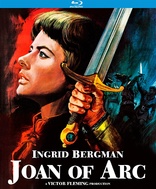
Movie rating
6.8 | / 10 |
Blu-ray rating
| Users | 0.0 | |
| Reviewer | 3.5 | |
| Overall | 3.5 |
Overview
Joan of Arc (1948)
During the Hundred Years' War, peasant girl Joan of Arc hears voices instructing her to save France from the English. Convinced that these unsummoned murmurings are divine messages from God, Joan consults the uncrowned Charles VII who, startled by the accuracy of her clairvoyance, assembles an army and installs her as its leader and spiritual guide. Her victorious forces reclaim much of their homeland from the English, but she herself falls into enemy hands.
Starring: Ingrid Bergman, José Ferrer, Francis L. Sullivan, J. Carrol Naish, Ward BondDirector: Victor Fleming
| Drama | Uncertain |
| History | Uncertain |
| War | Uncertain |
| Biography | Uncertain |
| Epic | Uncertain |
Specifications
Video
Video codec: MPEG-4 AVC
Video resolution: 1080p
Aspect ratio: 1.37:1
Original aspect ratio: 1.37:1
Audio
English: DTS-HD Master Audio 2.0 Mono (48kHz, 16-bit)
Subtitles
None
Discs
Blu-ray Disc
Single disc (1 BD)
Playback
Region A (B, C untested)
Review
Rating summary
| Movie | 4.0 | |
| Video | 3.5 | |
| Audio | 3.5 | |
| Extras | 0.0 | |
| Overall | 3.5 |
Joan of Arc Blu-ray Movie Review
Reviewed by Dr. Stephen Larson February 17, 2022As far back as she could remember, Ingrid Bergman always wanted to portray Joan of Arc on screen. In her memoirs, Ingrid Bergman: My Story, the Swedish actress recounts that her old employer, David O. Selznick, flirted with the idea of casting her in a biopic about the martyred saint for several years. (He also considered Joan Fontaine and Jennifer Jones for the role.) Bergman also recalls that she received a telephone call out of the blue from playwright Maxwell Anderson about performing the title role in his play, Joan of Lorraine (1946). She was ecstatic and nearly accepted Anderson's offer on the spot. The script she read was quite different than what she had in mind. The publisher of Joan of Lorraine described it as "a play within a play, the outer play (as it were) showing a group of actors in rehearsal on a bare stage, preparing to produce a Joan of Arc play." Bergman had been reading about Joan for most of her life and wanted the play to focus more on Joan. Anderson obliged and made a lot of changes to Bergman's liking. The play was a success on Broadway.
Backstage at one of the performances came Victor Fleming. The California native brought a book which he wanted to adapt and have Bergman star in but was so enthralled by her that he decided to make a film about Joan of Arc instead with Bergman playing the lead. Fleming, Bergman, and producer Walter Wanger formed their own production company together (Sierra Pictures). Bergman held stake in 40 percent of it while Fleming and Wanger owned 30 percent apiece. Anderson and collaborator Andrew Solt adopted Joan of Lorraine into a screenplay. It was reported fairly widely that the movie Joan of Arc (1948) was the most expensive picture Hollywood produced up to that point. Production costs ranged from $4.6 million to $10 million.
Unlike Joan of Lorraine, which is constructed in two acts, Joan of Arc is demarcated into five sequences with distinct locales: (1) Domremy; (2) Chinon; (3) Orleans; (4) Rheims; and (5) Rouen. The narrative spans from December of 1428 through May 30, 1431. It thus takes place during the years Joan was between the ages of 17 and 19. Given this is a classic biopic, I was surprised that it doesn't start out with Joan as a very young peasant girl. Bergman plays her all the way through, beginning when she hears voices and a calling from God that she's destined to lead France in a military fight against the English and Burgundians. When she arrives in the court of Chinon to tell the Dauphin, Charles VII (José Ferrer in his screen debut), she can't find him in his chair. Charles VII has planted an imposter there but that doesn't fool Joan, who locates him. He initially can't believe what she's telling him but gives her a chance to ride into battle. In two spectacular battles, she leads the French over the English in the siege of Orleans. Wounded but triumphant, she returns a national heroine but Charles VII steals the spotlight from her when he's commemorated as king. Joan is disappointed and furious with him for negotiating a truce with the British for financial reasons. The Duke of Burgundy (Colin Keith-Johnston) and John of Luxembourg (J. Carrol Naish) sells Joan, their captive, to the British for £10,000. Pierre Cauchon (Francis L. Sullivan), Bishop of Beauvais, and a panel of English ecclesiastical judges try Joan as a relapsed heretic in the film's final section.
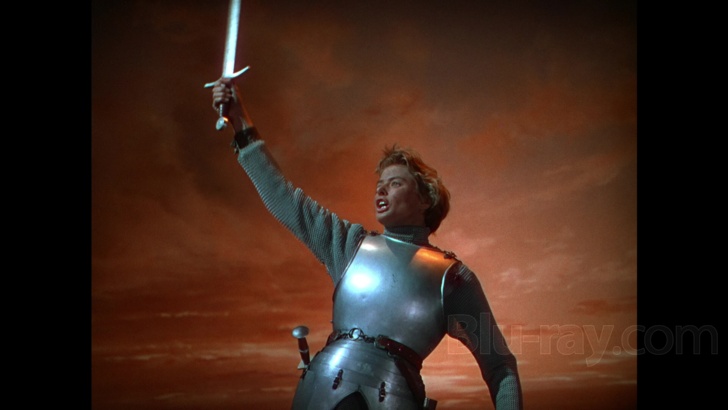
Joan of Arc (1948) is an old-fashioned biographic epic produced on a pretty epic scale. Though it deviates from its stage roots in several respects, it tends to resemble a theatrical production when the viewer discerns the matte paintings and artificial backdrops behind the actors. Indeed, the battle of Orleans was supposedly filmed on staged sets and not on authentic locations. Bergman and the massive ensemble cast are uniformly very good, though.
Joan of Arc received mostly glowing appraisals from critics. The Des Moines Tribune's film reviewer Jane Boulware portended that it "will be known as one of the greatest movies of all time. Character portrayal is superb; scenic production is artistic; historic details are followed meticulously." Kaspar Monohan of The Pittsburgh Press forecasted that "it will rank with the most lavish productions ever filmed. In wealth of pageantry and surge of battle it has had few equals."The Montclair (NJ) Times considered its place among other cinematic treatments of Joan: "Of all the many screen versions of the life of the Maid of Orleans, this is the most ambitious, spectacular, and one of the most deeply felt...an amazing recreation of one of the great, and greatly symbolic, human tragedies." Bergman's performance also earned very high marks. Nadine Subotnik of The Gazette (Cedar Rapids, IA) declared her interpretation of Joan as "the most shining of them all. It is, there can be little arguing, one of the best performances ever given on the screen." Audience reaction was highly favorable. The Newark (OH) Advocate and American Tribune reported that during Sunday screenings in Ohio's Midland Theater, both women and men wept. The reviewer went on to say: "Director Victor Fleming has made Joan of Arc a feature to rank with the great pictures of many years." The Tampa Bay Times reported that at a private screening on a Tuesday evening at the Capitol Theatre in St. Petersburg, Florida, an audience consisting of "a selected group of the clergy, educators, press and other representative citizens, sat through Joan of Arc silently, caught in a web of emotions." Roger O'Mara of the Arizona Daily Star sat with a preview audience composed primarily of clergymen and nuns who "enjoyed it thoroughly judging from several comments made afterward."
Joan of Arc Blu-ray Movie, Video Quality 
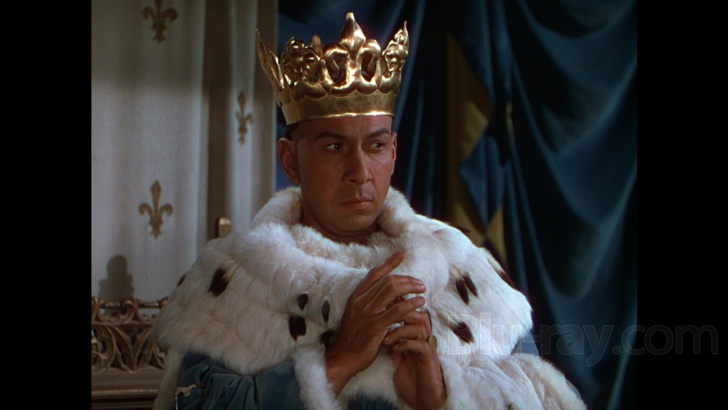
Kino Lorber Studio Classics has released a 70th Anniversary Edition of Joan of Arc furnished from a 2K restoration by the UCLA Film & Television Archive. UCLA also restored the movie to its original length of 145 minutes back in 1998. This 2K scan is presumably sourced from the same print that Image Entertainment worked with for its 2004 DVD. The Kino disc employs the MPEG-4 AVC codec and fits the feature on a BD-50 (disc size: 43.30 GB). French-based label Showshank Films released both the two-and-a-half-hour version and a 96-minute cut of the picture on a BD-50. The Kino sports a mean video bitrate of 33949 kbps while the Showshank sports an average bitrate of 29999 kbps for the 145-minute "director's cut."
Color values look luminous on the Kino transfer. My video grade would be higher if Kino would have cleaned up the occasional speckling and minor blotches. There's considerable print damage in the aftermath of the battle of Orleans. See in particular Screenshot #19. The capture doesn't display all of the artifacts present for the shot's length. The picture still appears most watchable throughout. The main titles (e.g., see frame grab #20) and the illustrations accompanying the first voice-over have been pillarboxed. My video score is 3.75/5.00.
The movie's famous Technicolor earned a majority of praise and only minor dissent. Gilbert Kanour of The Evening Sun (Baltimore, MD) deemed the film "one of the most magnificent spectacles vouchsafed by the cinema since the advent of Technicolor." The aforementioned critic Subotnik of The Gazette called it "a joy visually. Technicolor is as beautiful as ever offered. Settings are elaborate." The Montreal Daily Star was equally impressed: "The open air scenes are beautifully colored. Indeed, I know of no picture in which the technicolor process has been used impressively or the tone-coloring modulated more effectively to meet the requirements of varying scenes." The Brooklyn (NY) Daily Eagle's Lew Sheaffer was one of the few detractors. He thought the Technicolor added superfluous glitter to the chapel scene and on Bergman's close-ups. He wrote: "Technicolor was a distracting influence. It called attention to the deep blue of Miss Bergman's eyes, deep red of her lips and various other touches from the makeup man's skill and paraphernalia. It called attention to the physical and photogenic, whereas the scene should have projected only the spiritual, the emotional."
Kino only provides eight chapters.
Joan of Arc Blu-ray Movie, Audio Quality 
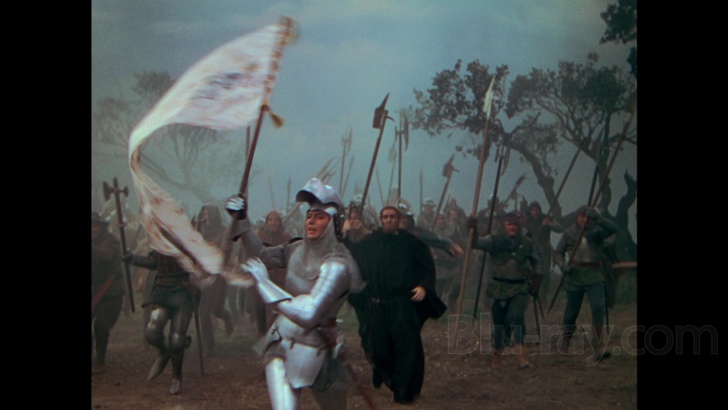
Kino has supplied a DTS-HD Master Audio Dual Mono (1560 kbps, 16-bit). The Showshank also uses a DTS-HD MA 2.0 Mono but the bitrate is lower at 1010 kbps. Kino's restored monaural track has some faint background hiss that isn't distracting. There are no pops, crackles, or audible dropouts. The St. Louis (MO) Globe-Democrat reported in 1949 that Joan of Arc had 248 speaking parts and 77 character roles. I didn't encounter any issues with spoken words throughout the runtime. (Unfortunately, there are no subtitles or closed captions.) Composer Hugo Friedhofer wrote a rousing score that comes to life during the battle scenes. Jerome Moross (future composer of The Big Country) did the orchestrations.
Joan of Arc Blu-ray Movie, Special Features and Extras 
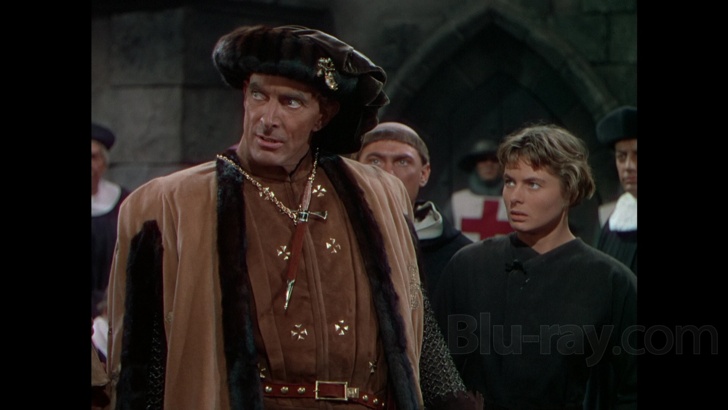
- Bonus Trailers - trailers for several Kino Lorber Studio Classics titles. Unfortunately, there's no trailer for Joan of Arc.
Joan of Arc Blu-ray Movie, Overall Score and Recommendation 
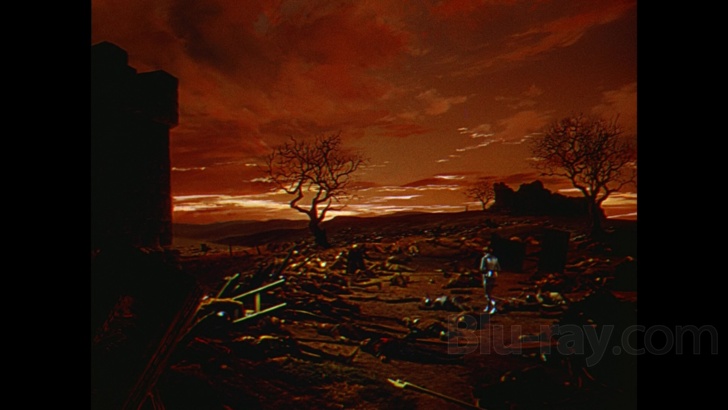
Joan of Arc is a big-budgeted costume spectacle that offers a three-year capsule of the great saint's life. While its production values are high, it artistically can't compete with the likes of Dreyer's La passion de Jeanne d'Arc (1928) and Bresson's Procès de Jeanne d'Arc (1962). Ingrid Bergman's performance is both admirable and compelling. I still wouldn't rank it as high as her best work with Selznick and Hitchcock, though. Kino Lorber sources the same restored print from the UCLA Film & Television Archive that's on the French Blu-ray. I believe that additional image cleanup and a fresh 4K scan can make the picture look better. There are absolutely no extras. I would have expected an audio commentary by a film historian on a release like this. Still, a VERY SOLID RECOMMENDATION for Joan of Arc.
Similar titles
Similar titles you might also like

Kagemusha
影武者
1980

Henry V
1944

Che: Part Two
2008

The Last Duel 4K
2021

Henry V
1989

Che: Part One
2008

Patton
1970

Darkest Hour 4K
2017

Macbeth
Special Edition
1948

The Messenger: The Story of Joan of Arc
1999

The Battle of Algiers
La battaglia di Algeri
1966

Richard III
1955

Age of Uprising: The Legend of Michael Kohlhaas
2013

Becket
1964

A Man for All Seasons
1966

Churchill
2017

The Crusades
1935

Alexander the Great
1956

El Cid
1961

Chimes at Midnight
1965